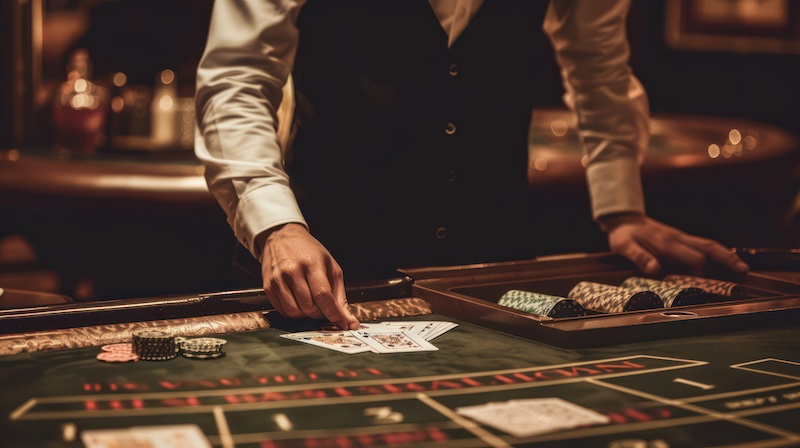Philip Dennis Ivey Jr. represents a fascinating case study in the world of casinos. Born in 1977 in Riverside, California, and raised in Roselle, New Jersey, Ivey developed a profound understanding of mathematical and psychological aspects of games of chance that transcends traditional gambling.
Most people know him as one of the greatest poker players of all time. With 11 World Series of Poker bracelets to his name, his reputation is hard to argue with. But Ivey’s relationship with casinos isn’t just about poker. Over time, he realized he could apply his technical approach to poker to other casino games. That shift became a turning point in his career, opening up ways to navigate games with completely different odds and house edges.
His story, though, isn’t just about full houses and royal flushes. It’s really about what happens when raw instinct and technical skill meet the highly-controlled world of casino gaming. Ivey figured out how to play that bigger game, too.
Phil Ivey – An Elite Gambler Was Born
Ivey’s story as a professional gambler started unconventionally. In the mid-1990s, at the age of 16, he used a fake ID to access Atlantic City’s casinos. While this was legally questionable, it guaranteed him early exposure to the casino environment, setting the basis for something that would soon be an epic run in the gambling world.
During these clandestine sessions at the lower stakes poker tables, Ivey developed an understanding of real-time probabilities while observing behavioral patterns at the same time. He evaluated each play not by its immediate result, but by its mathematical expectation in the long run.
Soon, these ventures at the lower-stakes cash games turned into poker tournament success. In 2000, at 23 years old and now playing legally, Ivey played his first World Series of Poker and his debut guaranteed him three cashes, two final tables and a win at the $2,580 Pot Limit Omaha event for $195,000 and his first bracelet.
How Ivey Became One of the Most Feared Poker Pros of All Time
That first bracelet was just the start of something huge. Over the next 20 years, Ivey built the kind of career most gamblers only dream about: 11 WSOP bracelets, millions won in nosebleed cash games, and a reputation that made even veteran pros think twice before sitting down at his table.
What really sets him apart, though, is the way he blends sharp mathematical thinking with a kind of instinct you simply can’t teach. While many players dominate one aspect or the other, Ivey managed to master both.
That balance didn’t just make him a poker legend; it gave him the tools to branch out into other casino games too, where reading odds and managing risk are just as valuable.
While poker was the game he staked his name on, other traditional casino games would soon be important down the line. Reflecting on those formative years in the book Deal Me In, Ivey wrote that “It was obvious very early that [I] had a gift when it came to gambling”.

When Phil Ivey Transitioned to High-Stakes Casino Gambling
After poker domination, Ivey has done something that not many players can do: he applied the same mental discipline and mathematical analysis to other casino games. It wasn’t a casual transition either – it was a calculated expansion of his skills.
The Love for Baccarat
At some point, Ivey started to gravitate toward baccarat, and it’s easy to understand why. For a guy used to calculating pot odds and reading opponents, the simplicity of baccarat must have been refreshing: clear rules, binary outcomes, and the house edge isn’t brutal. More importantly, it’s a game where focus and discipline, two of Ivey’s greatest strengths, make all the difference.
Ivey’s baccarat sessions became legendary in high-roller circles. We’re talking single bets worth hundreds of thousands of dollars, sessions that lasted for days, and an approach to the game that impressed even the most seasoned dealers. He didn’t play on impulse or emotion; every bet was a cold calculation.
What set Ivey apart from other high rollers was not the size of his bets, but the way he approached each session. While a lot of different sharks saw the casino as an expensive form of entertainment, Ivey regarded it as another arena where he could excel.
Players who watched him play baccarat describe sessions where he was able to keep focused throughout 15-18 consecutive hours, maintaining detailed patterns and anomalies registered in his mind. The superior ability to focus developed at the poker felt proved invaluable at the baccarat tables.
If this article interests you, keep reading. Alternatively, explore other topics like blackjack strategy, roulette strategy, and craps strategy.
When Skill Becomes Problematic: The Legal Battles
Sometimes, though, being too good at what you do can become problematic. Ivey figured this out when his techniques took him to court on two different continents.
The saga began in 2012, when Ivey and his partner Cheung Yin “Kelly” Sun started a series of baccarat sessions that would be forever in the history books. Between April and October 2012, they made four trips to the Borgata Casino in Atlantic City. By the time they were done, they’d walked away with $9.6 million in winnings, thanks to a technique known as “edge sorting.”
The idea was simple, at least in theory: they spotted tiny imperfections in the card backs and used those imperfections to figure out what cards were coming.
The pair didn’t mark the cards or physically alter anything. They simply asked the dealer to turn certain cards in a particular way, a perfectly legal request that many casinos accommodate for high-rollers. The issue arose when the casino realised that these seemingly harmless requests were part of a sophisticated system.
In August of the same year, Ivey used the same method at the Crockfords, one of London’s most prestigious casinos, winning £7.7 million. Contrary to the Borgata, Crockfords refused to pay out the winnings, suspecting foul play, which led Ivey to sue the casino in 2013, alleging his methods were legitimate.
While the Borgata had paid out the winnings immediately, after it came to light that they were using edge sorting, the casino took the case to court, demanding the return of all the Ivey’s winnings plus comps and an estimate of how much the casino would have won in normal conditions, totaling $15.6 million.
The courts had a fascinating question in hand: did Ivey cheat? Technically, Ivey and Sun hadn’t manipulated a thing. They simply used available information by careful observation and legitimate requests.
In 2014, a UK judge ruled that while Ivey genuinely believed his actions were legitimate, they still constituted cheating under civil law. In the U.S., the court ordered Ivey to return $10.1 million to the Borgata for violating New Jersey’s Casino Control Act. After six years of legal battles, both cases concluded in 2020 with a confidential settlement.
For a full, in-depth analysis of these legal cases, check out our comprehensive guide to edge sorting and Phil Ivey’s legal battles.

Phil Ivey’s Legacy in Casino Culture
Ivey has left a mark that goes beyond just numbers. Following the well-publicized edge sorting scandal, casinos and card manufacturers significantly tightened their security measures and improved their methods.
The truth is that Ivey forced an entire industry to evolve. He proved that even the most sophisticated properties could be vulnerable to players with exceptional analytical abilities.
It created a weird dynamic in which casinos chase after the same elite players they also keep an eye on. Phil Ivey ended up right in the middle of that tension: prized for the attention he brought, but also viewed with suspicion every time he played.
He’s become something of a symbol for that paradox. No matter how airtight the systems seem, there’s always someone sharp enough to find a crack. Perhaps that’s part of why people keep coming back. It’s not just about the money, it’s about the idea that the house might not always win.
** Lead image courtesy of PokerGO


